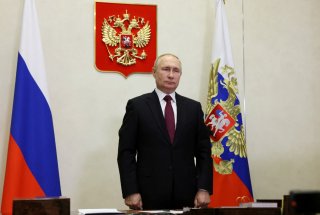How Putin Is Pushing Russia Toward De-Dollarization
The United States must pursue a strategy that diminishes the efficacy of Russian natural resource exports.
Industry was the second central pillar of Putin’s remarks at the EAEU summit. “[T]he member states of the Union continue to successfully develop mutually beneficial industrial cooperation,” Putin said before touting the establishment of a new mechanism within the EAEU that will “grant loans and subsidies to promising joint projects.”
As mentioned above, industry makes up one-third of Russia’s economy. How does that compare to its main adversaries? Industry comprises notably less of the French (16.8 percent), American (18.5 percent), and German (26.6 percent) economies. Russia surprisingly exceeds even Germany in this metric. The winner of this bracket is, once again, China, at 39.5 percent
The use of these statistics is not to argue that Russia is structuring its economy in a superior way to Western countries. It simply underlines a preoccupying trend: Russia’s priorities, financial ambitions, and the organization of its economic sectors increasingly resemble China’s. De-dollarization signifies far more than alternatives to SWIFT—it is a comprehensive transformation that involves profound financial restructuring and the enlistment of key allies. Russia is starting with Central Asian countries by insisting on the EAEU’s efficacy.
Moscow has made its greatest strides toward de-dollarization domestically, however, and this initiative is inextricable from its coercive natural resource diplomacy. For instance, major fuel and oil companies are planning to increase the use of the yuan in their operations. In August 2022, Russians bought a record number of the Chinese currency after Beijing doubled the yuan-ruble trading band in March to provide more flexibility in currency exchanges.
Nevertheless, Russian officials and business executives are well aware that this process is arduous and entails its own risks. “Russia needs dollars since there are many dollar deposits inside the country, and corporations have debts denominated in dollars,” one warned. Last month, even Putin said that Russia “will not give up the dollar,” but will instead dramatically reduce its shares. China still accounts for a smaller proportion of Russian exports than Western countries and the digital yuan is not yet an adequate replacement for the dollar. But time is running out.
The United States must pursue a strategy that diminishes the efficacy of Russian natural resource exports and hampers Moscow’s rapprochement with China while supporting its European allies.
Axel de Vernou is a sophomore at Yale University studying Global Affairs and History.
Image: Reuters.

